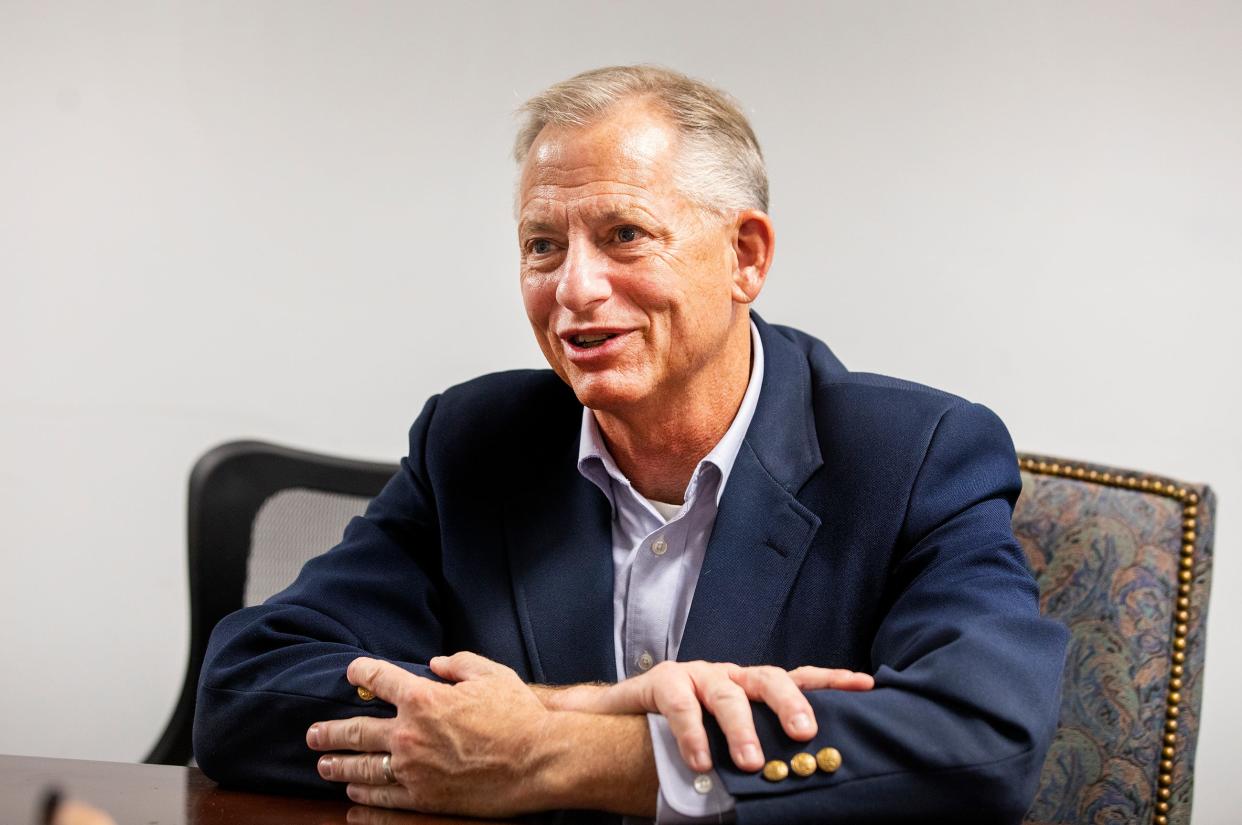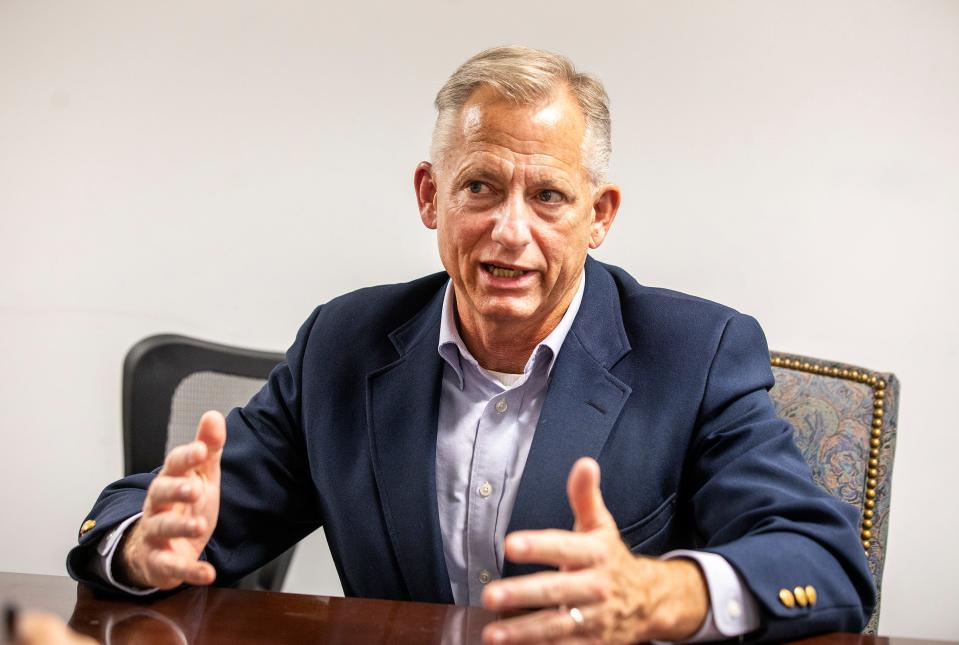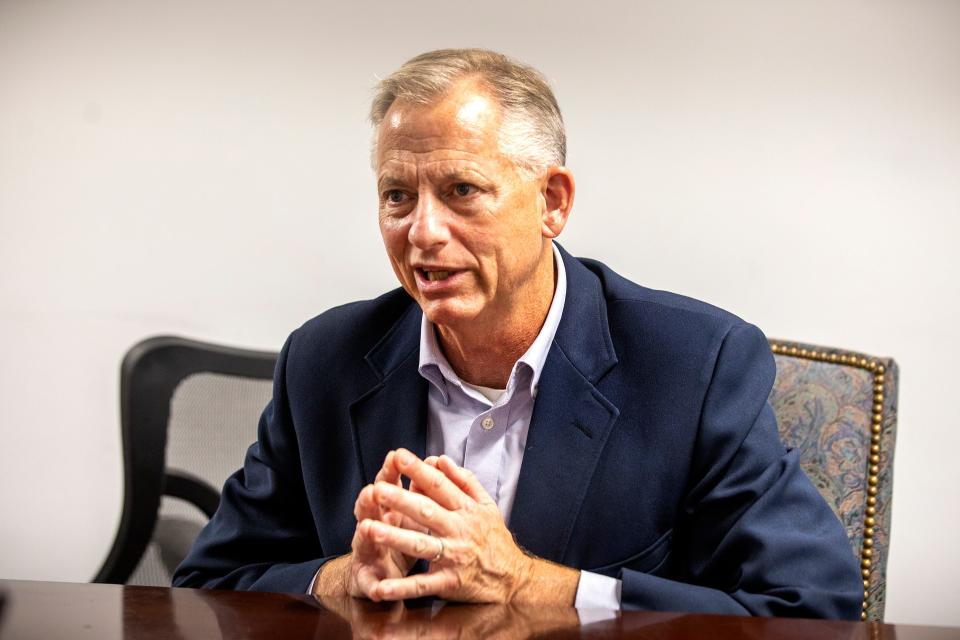'Fed up with the power': Libertarian presidential candidate projects hope for 2024

- Oops!Something went wrong.Please try again later.
A presidential candidate recently visited Lakeland.
No, not a current or past president, and not a certain governor. This candidate could have sauntered through Munn Park or Lakeside Village and perhaps not been recognized by any local residents.
Mike ter Maat hopes the situation will be dramatically different a year from now. The longtime Floridian, now living in Virginia, is one of 36 Libertarian candidates for president. He said he only knows five of the others and described them as “terrific” but confidently predicted that he will gain the nomination when the party holds its convention next Memorial Day weekend in Washington, D.C.
Earning the nomination of a third party is one thing. The best a Libertarian candidate has ever done in a presidential election was 2016, when Gary Johnson captured 3.3% of the vote. But ter Maat believes the next election could be a turning point.
“I think that in 2024, we have a much larger opportunity than we have in the past,” he said, pointing to the limited appeal of the two probable candidates from the major parties, President Joe Biden and former President Donald Trump.
“Clearly, these are two unpopular politicians,” ter Maat said. “And I think that you would have to acknowledge that that creates an opportunity for a third candidate and a third party.”
Ter Maat, 62, is tall and trim, with the rugged bearing of the former police officer he is. His wife, Nancy, joined him for the stop in Lakeland, part of a multi-day swing through Florida.
The candidate said he lived in Florida for about 20 years, working as a police officer in Broward County, before moving to Virginia. Ter Maat said he gravitated to the Republican Party in his youth, assuming that it was the right place for someone committed to free-market economic policies associated with the Austrian School.
Leaving Republican Party
A holder of a doctorate in economics from George Washington University, ter Maat worked in finance and economics and served in the White House Office of Management and Budget as a financial economist under President George H.W. Bush.
But ter Maat grew disillusioned with the Republican Party and politics in general. In the 1990s, during a discussion of politics, a friend told him, “You’re a Libertarian.” At first, ter Maat considered that an insult.
“But he was apparently correct in a way that I had not appreciated, not only at that moment, but I don't think I fully appreciated it for a number of years after, and I didn't register for another dozen years, probably, as a Libertarian,” he said.

Ter Maat made the switch around the time he became a police officer in 2010. He retired from that role in 2021.
The Libertarian Party emphasizes limited and decentralized government, individual rights and free markets. In ter Maat’s case, that translates to a campaign platform he calls the Gold New Deal — contrasting with Roosevelt’s New Deal of the 1930s (and the Green New Deal proposed by some current Democrats).
Ter Maat advocates for a 10-point plan that includes ending the Federal Reserve; eliminating the Internal Revenue Service and FBI and many federal agencies (such as the Departments of Agriculture, Education and Transportation and the Environmental Protection Agency); setting term limits for members of Congress; and ending “discretionary military interventionism.”
The candidate believes states should have the right to resolve any discrepancies between federal and state laws in state courts. He wants to limit government spending to “a Constitutionally prescribed proportion of national income” and would allow the federal government only to fund initiatives at the national level.
Many of his proposed changes would require action by Congress.
Ter Maat also promotes police reform, rejecting what he considers the simplistic approaches of “back the blue” from the right and “defund the police” from the left. He advocates for ending the federal doctrine of qualified immunity for police officers and agencies. With his abolition of the FBI, he would have no federal law enforcement.
The candidate calls for a phase-out of public education, with funding given to each student equivalent to the funding for public schools. He would eliminate public funding for higher education, including student loans.
While Libertarianism is often viewed as a subset of conservatism, some of ter Maat’s proposals contrast with standard Republican policies. He opposes the death penalty, calls for decriminalizing the use of illegal drugs and says no government should inhibit access to abortion before fetal viability. (He also said the Supreme Court was correct to invalidate the Roe v. Wade ruling and that states should establish laws on abortion.)
Those positions are listed under the heading “Preserve Individual Autonomy,” which also decries corporate bailouts, libel laws, a military draft, mandates for vaccinations or medical treatments and the censorship of any privately controlled mode of communication.
Ter Maat’s Gold New Deal platform does not emphasize “culture war” issues, which have become prevalent in politics: LGBTQ rights, same-sex marriage, critical race theory and the teaching of American history. He said he considers the “failed” war on drugs to be a cultural issue.
Should ballots be counted by hand? Conservatives in Polk County want the option
“If you're talking about culture issues as a politician, I believe you have already screwed it up,” he said. “You have already tipped your hand that you would like to use public policy to affect society's culture, and I think that's wrong, per se.”
Ter Maat’s platform does not mention climate change, though in a candidate comparison on his website he calls for “free markets to encourage pro-growth drilling, piping, fracking and nuclear power.”
Ter Maat said he believes that most Americans have a Libertarian streak and just don’t realize it. He said people can gravitate from the right — focusing on free markets and the rights of individuals to make their own decisions — or from the left — questioning whether government has the moral right to make decisions for individuals.
“I think we tend to draw more folks as former Republicans than former Democrats,” ter Maat said. “But it's not as lopsided as I used to think. Whereas, maybe if you had asked me 20 years ago, I probably would have said it’s probably three to one (Republicans), it’s now more like 60-40.”
Anticipating 4-way race
Ter Maat acknowledges the challenges a Libertarian candidate faces in the presidential election. The party isn’t always able to get its nominee on the ballot in all 50 states, and the two major parties carry enormous advantages in financing. As of Wednesday, ter Maat had reported about $163,000 in campaign contributions, whereas Biden and the top Republican candidates have received tens of millions in donations and also have political committees bolstering their campaigns.
The Libertarian brand is not as strong as it should be, ter Maat said. Johnson, the former governor of New Mexico who took 3.3% in the 2016 presidential race, was better qualified than other Libertarian nominees, he said. But Johnson badly hurt his campaign by failing to recognize the name of Aleppo, a Syrian city, during a TV interview.

The candidate pledged that if he becomes the Libertarian nominee he will run a “principled” campaign that hews to the party’s core beliefs. It’s crucial for the Libertarian candidate to present a stark contrast to the campaigns of the Democratic and Republican candidates, he said.
“The platform that that we have put together is a collection of the most transformational ideas in Libertarian thought,” he said.
Ter Maat said he believes the 2024 election presents a unique opportunity because polling shows that both Biden and Trump generate limited enthusiasm among some in their own parties and strong opposition from voters in the opposing parties. He also mentioned Robert F. Kennedy Jr., a former Democrat who plans to run as an independent candidate and could siphon votes from the major-party nominees.
“Remember that in a three-way race, 37% wins,” ter Maat said. “I realize, mathematically, 33.4% could win, but as a practical matter, 37 does win. … To win in a four-way race is a much smaller number.”
He added: “If you consider winning, disrupting the way the system has worked up until now; if you consider winning, forcing the other parties to take into consideration your principles and values going forward; if you consider winning, keeping Republicans and Democrats from just presuming that it’s just the two of them, ad nauseam, forever, then you can win with the party and with the platform and with the campaign that we have.”
At this point, ter Maat’s organization comprises 15 paid staffers, about a dozen advisers and a cadre of volunteers, he said.
“So we have a growing team already,” he said. “We're not quite ready for the general election, but we're getting there.”
While ter Maat suggests that Libertarian ideas can appeal to most Americans, he has to recognize that some of his proposals may seem too radical for voters on both the left and the right.
“I agree with you that for some Americans, it will be,” he said. “What we're discussing is — for how many won't it be too much? And I would argue that for a whole bunch, it won't be too much, that there are a lot of Americans who are so fed up with the power of the federal government that they're willing to hear a more radical message than in the past.”
Gary White can be reached at gary.white@theledger.com or 863-802-7518. Follow on X @garywhite13.
This article originally appeared on The Ledger: Visiting Lakeland, Libertarian candidate expresses hope for 2024 race

